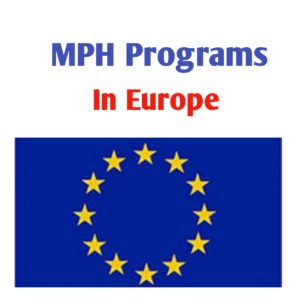A Master of Public Health (MPH) degree is a graduate-level program that emphasizes the practical aspects of public health. This type of program is designed to prepare students for their role in promoting community awareness about injury, violence prevention, communicable diseases, and other issues that affect health and safety. Since research is not usually a primary focus in most MPH programs, students desiring careers as professors or researchers of public health should pursue a Master of Science in Public Health (MSPH) degree.
The European dimension to public health activity is being increasingly recognised as one of the major future influences on public health policy and practice. Since MPH programs are applied for degree programs, students are required to engage in work-related activities. This may take the form of an internship or practical experience where the student assumes job functions in the public health field, while under supervision. Additionally, some programs may require students to participate in a small, semester-long project such as a research paper or grant proposal that shows their competence in the field.
The European Union (EU) works for better health protection through its policies and activities, in accordance with Article 168 of the Treaty on the Functioning of the European Union. EU action on health issues aims to improve public health, prevent diseases and threats to health (including those related to lifestyle), as well as to promote research.
Some programs require students to choose a specific track or emphasis area for completion of the program. Although the degree itself is not a truly specialized degree, the three to five courses required for the emphasis area can provide students with more specific knowledge about an area of interest.
Many universities in Europe offer specialized MPH degree programs, which can provide graduates with better career opportunities. Students may choose a program that offers them specialized training in one of the traditional core areas, or more unique specialties such as maternal/child health, public health education, communicable diseases, toxicology, or disaster management. SEE MPH In Canada
Most MPH programs in Europe are designed to be completed in two to three years, and may not have a thesis requirement. Some schools offer the option of an advanced, one-year program. However, these programs are typically geared toward students who are concurrently pursuing another graduate degree in a related field. These are referred to as dual-degree or joint-degree programs. One-year programs that do not require concurrent enrollment in another program are terminal degrees that do not require a thesis. An increasing number of schools are offering their programs completely online or in a hybrid on-campus and online method.
Student Schengen Visa – Traveling to Europe for Study Purposes
A Student Schengen Visa is an entry permit to the Schengen Zone, granted to third-country nationals wishing to enter and remain for short stays in any of the member states, for the purpose of studying.
This visa permits its holder to remain in the Schengen territory for a maximum of 3 months. If your study or training course lasts longer than that, you should apply for a Long-Stay Study Visa at the embassy of the respective country.
Only the nationals coming from third countries that have not signed a visa-free agreement with the Schengen Area member states are in need of a Student Schengen Visa.
What Documents are Required When Applying for a Student Schengen Visa?
The mandatory documents to apply for a Student Schengen Visa are as follows:
- Two visa application forms. Fully completed, with correct and honest answers. Print it and sign the form at the end.
- Two identical photos. Taken within the last three months according to the Schengen visa photo requirements.
- Valid passport. Issued within the last 10 years with validity of at least 3 months after the end of the planned journey.
- A copy of a passport’s biometric data.
- Previous passports. Tied together with a rubber band. Do not staple them!
- Proof of residency. Some sort of document issued by the country where you are applying as proof that you are a citizen or resident of that country.
- Roundtrip reservation or itinerary. Specifying the dates and flight numbers of entry and exit from the Schengen area. Here you can learn more about how to book a flight reservation for an EU visa application.
- Travel medical insurance. A document issued by your Europe health insurer, confirming you have insurance for the whole Schengen territory, throughout your whole stay with coverage of €30,000 for emergency health situations.
- Proof of accommodation. Evidence of where you will be staying, during your time in the Schengen zone. This could be one of the following:
- Dormitory contract. Signed between you and an official of a dormitory in the country where you will be staying.
- Rent Agreement. A contract with a property owner in this Schengen state, specifying the address and other information details about the facility and landlord.
- Letter of Invitation. A letter written by a resident in the country you are applying to enter, confirming they are willing to take you in their home throughout the period you will be there.
- Letter of acceptance at an EU University/College/School. A recent, official, and signed letter stating your name/type of studies/length of studies/part of a European program if applicable/number of hours per week.
- Proof of academic qualifications. Diploma, academic records, attestation of the application for equivalence, or decision/dispatch of equivalence.
- Proof of financial means. Documents that show one is able to reside and financially maintain him/herself during their stay in the Schengen zone. This can be one of the following:
- Original attestation of an official scholarship of minimum 631€/month.
- Bank account statement. Showing your bank balance for the last three months.
- Proof of paid visa fee
- Additional Documents are required for Minors.
- An extract of the minor’s birth certificate.
- An identity document bearing the parents’ signature (one document for each parent).
- A declaration of consent from both parents, stating that the minor can travel.
- If relevant: a court judgment stating which parent has been allocated parental responsibility for the minor.
- If relevant: a declaration from the minor’s school consenting to his/her absence.
- Proof of occupation.
- If employed:
- Employment contract
- Leave permission from the employer
- Income Tax Return
- If self-employed:
- A copy of your business license,
- Company’s bank statement for the latest 6 months
- Income Tax Return (ITR)
- If a student:
- Proof of enrollment
- No Objection Letter from University SEE: Salary Outlook For MPH Degree Holders
Where to Submit a Student Schengen Visa Application
You should submit your Student Schengen Visa Application at the responsible Embassy / Consulate / VAC of your main Schengen destination in your country of residence. To figure that out check the rules on How to Choose the Right Embassy/Consulate/VAC to Submit the Student Visa Application.
To submit your Student Schengen Visa application successfully, follow these steps:
- Check if you need a Student Schengen Visa.
- Figure out where you need to apply.
- Figure out the best time to submit your visa application.
- Fill out the application form for a short-stay visa.
- Collect the required documents for a Student Schengen Visa.
- Make an appointment.
- Attend the interview.
- Pay the student visa fee.
- Wait for a response.
When to Apply for a Student Schengen Visa?
According to the Schengen rules, the period within which you can submit a Student Schengen visa application is as follows:
- The earliest: three months prior to your trip towards Schengen.
- The latest: 15 days prior to your trip.
However, you are highly recommended to apply about 4 weeks prior to your departure date, since this way you will give the embassy enough time for processing your visa.
How Long Does it Take to Get a Student Schengen visa?
The legal processing time for a Student Schengen visa is 15 calendar days. In some cases, you can receive an answer within even shorter periods. However, in extraordinary cases this period may also extend from 30 to 60 days.
How Long is the Student Schengen Visa valid?
The Validity of a Student Schengen Visa is up to three months within a six-month period. When you get the passport with the visa in it, check the visa sticker information, to make sure about the validity period and the duration of permitted stay in the Schengen Area.
Can I extend a Student Schengen Visa?
A student Schengen Visa can be extended only in some very specific cases such as a late entry, humanitarian reasons, force majeure, or important personal reasons. For more information, read How to Extend a Schengen Visa.
However, if you wish to extend your Student Schengen Visa with the purpose of continuing your studies in the Schengen State where you are, that is not possible. Instead, you will have to return to your home country / country of residence and apply from there for a long-stay study visa.
Can I work under a Student Schengen Visa in Europe?
No, you cannot. Some long-stay Study Visas permit students to work for a limited number of hours per week. However, no Schengen member state allows you to get a job under a Student Schengen Visa. 12 Top Online MPH With No GRE Requirements





